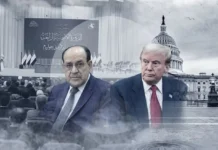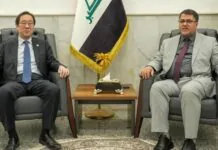Tishwash: The government adopts the “Oliver Wyman Strategy” for the development road project.
Prime Minister Mohammed Shia al-Sudani chaired the regular meeting of the Higher Committee for the Development Road on Sunday, September 28, 2025, in the presence of the Ministers of Transport and Construction and Housing, the Chairman of the National Investment Commission, a number of advisors and executives, and representatives of Oliver Wyman, the company’s private consultant.
During the meeting, according to a statement from Al-Sudani’s office, a copy of which was received by Al-Jabal, “the latest developments in the project and the procedures required to proceed with its stages were discussed. The draft law of the authority for the development road, the port of Faw and the industrial cities was reviewed. The rates of progress achieved in the technical and administrative aspects, as well as the plans related to the railway and the road were also reviewed.”
Regarding the Grand Faw Port, according to the statement, “the Director General of Ports presented a detailed report on the percentages of the latest achievements in the roads and the submerged tunnel, and the remaining percentages of completion. He also discussed the operational file and details of the offers submitted by other companies and countries.”
Al-Sudani pointed to “the importance of the project and the need to shift work from the technical and administrative aspects to practical implementation, so that citizens are fully informed of the efforts being made by all state institutions to complete the first stages of the development path,” stressing that “the next phase will witness the commencement of the actual implementation of the process.”
The meeting discussed the project’s progress with the Kurdistan Region of Iraq, the results of the recent quadripartite meeting of the project’s contributing countries in Baghdad, and the issue of land expropriation. The Prime Minister directed the head of the Higher Council for Coordination between the Governorates to communicate with the relevant governorates and resolve the remaining expropriation issue.
According to the statement, “Oliver Wyman presented a summary of its progress on the integrated strategy for the Development Road project, which includes governance, the road, the railway, the economic strategy, investment opportunities, and investor outreach. It proposed beginning implementation of the strategy and agreeing to share the interim governance protocol with partner countries before the upcoming quadrilateral ministerial meeting in Baghdad.”
During the meeting, it was decided to “adopt the complete strategy submitted for the project.” link
****************
Tishwash: Central Bank: We have comfortable foreign reserves capable of defending the exchange rate.
Central Bank Governor Ali Al-Alaq announced on Sunday that Iraq is currently experiencing its lowest inflation rate in history. He noted that Iraq possesses comfortable foreign reserves capable of defending the exchange rate and emphasized the creation of a sound investment environment following the significant success of monetary policy.
format issues
In his speech at the Iraq Investment Forum, Central Bank Governor Ali Al-Alaq said, “The current phase in Iraq is characterized by stability, reform, and openness to investment.” He noted that “the Central Bank is a prerequisite for achieving this stability through its monetary and fiscal policies, controlling inflation, supporting and stimulating various economic initiatives, addressing the demands of the situation, and enabling the private sector to operate in a suitable environment.”
He added, “Achieving monetary and financial stability is the result of several factors, most notably the daily policies pursued by the Central Bank in addressing developments and challenges, the prudent management of financial reserves, which constitute a fundamental pillar for achieving stability, and the management of the banking sector in a way that contributes to strengthening this process.“
He pointed out that “one of the most prominent indicators of the success of monetary policy is creating a sound investment environment through controlling inflation rates,” explaining
that “general price stability constitutes an important foundation for the private sector and investors, while turbulent environments in terms of price and inflation levels hinder real growth.”
He pointed out that “the Central Bank is giving this issue top priority through close monitoring to ensure overall price stability,” emphasizing that “Iraq is currently experiencing the lowest inflation rates in its history, which reflects the success of monetary policies in controlling and managing the flow of currency, in addition to the presence of comfortable foreign reserves capable of defending the exchange rate and achieving a significant balance between supply and demand for foreign currency.” link
****************
Tishwash: Dr. Mahoud: The banking reform plan focused on three main factors.
The Prime Minister’s advisor for banking affairs, Saleh Mahoud, confirmed on Sunday that the banking reform plan focused on three main factors, while noting that the World Bank praised Iraq’s progress in electronic payments.
Mahoud said, “The banking reform plan adopted by the Central Bank of Iraq in coordination with the government took into account three main factors: trust, speed of procedures, and the development of banking tools.”
He explained that “investors seek trust, speed of procedures, and modern banking products, and these elements represent the fundamental pillars of any investment environment.” He noted that “enhancing trust depends on the presence of effective institutions and compliance with anti-money laundering regulations, which positively impacts investor confidence in the banking system and investment environment.”
He added, “The speed of procedures means a shift toward digitization and the development of electronic payment methods, which is what the banking reform plan focused on through extensive coordination between the government, the Central Bank, and the private sector.” He noted that “the relevant committees are working in an organized and effective manner.”
He pointed out that “the most prominent challenges facing the digital transformation process lie in societal culture and resistance to change, given that Iraqi society relies on cash.” He explained that “the government and the Central Bank have sought to spread the culture of electronic payment through practical decisions, including adopting fuel stations as a starting point for card payment experiments, which has contributed to raising awareness of the importance of these tools.”
He pointed out that “other challenges relate to infrastructure, legislation, and cybersecurity, as well as the gap between cities and villages in the field of digital services,” noting that “the government, in coordination with the Central Bank, has issued clear instructions to activate electronic payment tools in the governorates.”
He added, “During a recent symposium, World Bank experts praised the rapid progress Iraq has made in electronic payments and financial inclusion over the past three years, stressing that the indicators recorded in the number of cards and electronic payment devices reflect this development link





